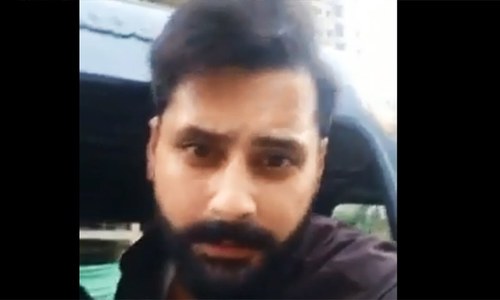Lawyer and activist Jibran Nasir, who is contesting general election as an independent candidate from PS-111 and NA-247 in Karachi, held a press conference on Wednesday to address what he termed the "incidents of violence" against his supporters and campaign volunteers.
The presser, that was broadcast live on Facebook, was held a day after a handful of men reportedly interrupted a corner meeting held by Nasir in Delhi Colony where they told him to explain to them his religious views and accused him of blasphemy.
Addressing media representatives outside the Karachi Press Club, Nasir claimed that some "extremist elements" wanted to hijack his campaign by inciting hatred among people "because they are scared of a candidate who wanted to highlight the actual problems and issues being faced by the public".
Nasir vowed that he will continue to focus on his manifesto that is based on development issues and will not back off from his stance as that would be his real defeat.
"I am being accused of blasphemy without any proof," he said. "The volunteers working for my campaign are being threatened." Despite the intimidation, Nasir said his team had never retaliated or tried to "take the law into their own hands".
The activist-turned-politician claimed that extremist elements were spreading propaganda against him on religious grounds because there were no corruption cases that could be used to go after him.
"They (miscreants) appear at every corner meeting and ask me about my religious beliefs and when I tell them, they claim that I'm lying," he said. "They demand that I curse a community that has already been declared non-Muslim by the Constitution."
"The community, known as the Ahmedis, is not even allowed to protest when one of them is targeted. What religion teaches us to oppress those who are already being oppressed?" he asked, adding that Jinnah had created Pakistan in order to protect the subcontinent's Muslims, who were an oppressed minority in pre-Partition India.
Jinnah's vision, Nasir said, was to create a state where minorities were protected and safe. "Am I wrong to follow in the footsteps of Jinnah?" he questioned.
Nasir repeated that some people were trying to incite hatred and recalled how similar propaganda resulted in the tragic murder of Mashal Khan at the Abdul Wali Khan University in Mardan last year. Khan was killed by a mob that accused him of committing blasphemy and the accusations against him later turned out to be false.
He urged political parties to discourage hateful behaviour as that would discourage youth from entering politics.
Nasir told reporters that he had written a letter to the authorities, asking them to arrest the men who tried to inflame the situation during his corner meetings. The men could be identified from the videos shared on Nasir's Facebook page.
"We didn't ask the authorities to provide us security and turn us into VIPs because that is not the solution," he said, adding that if no action was taken against the men, they will continue to incite hatred.
















































